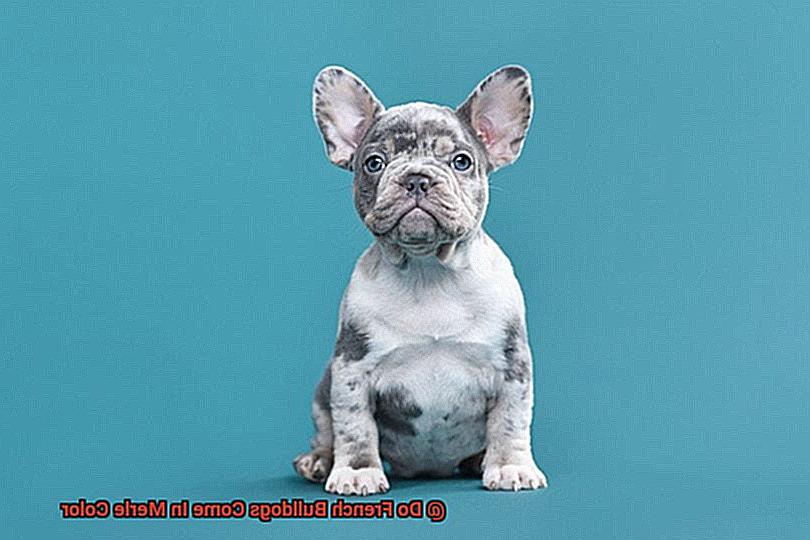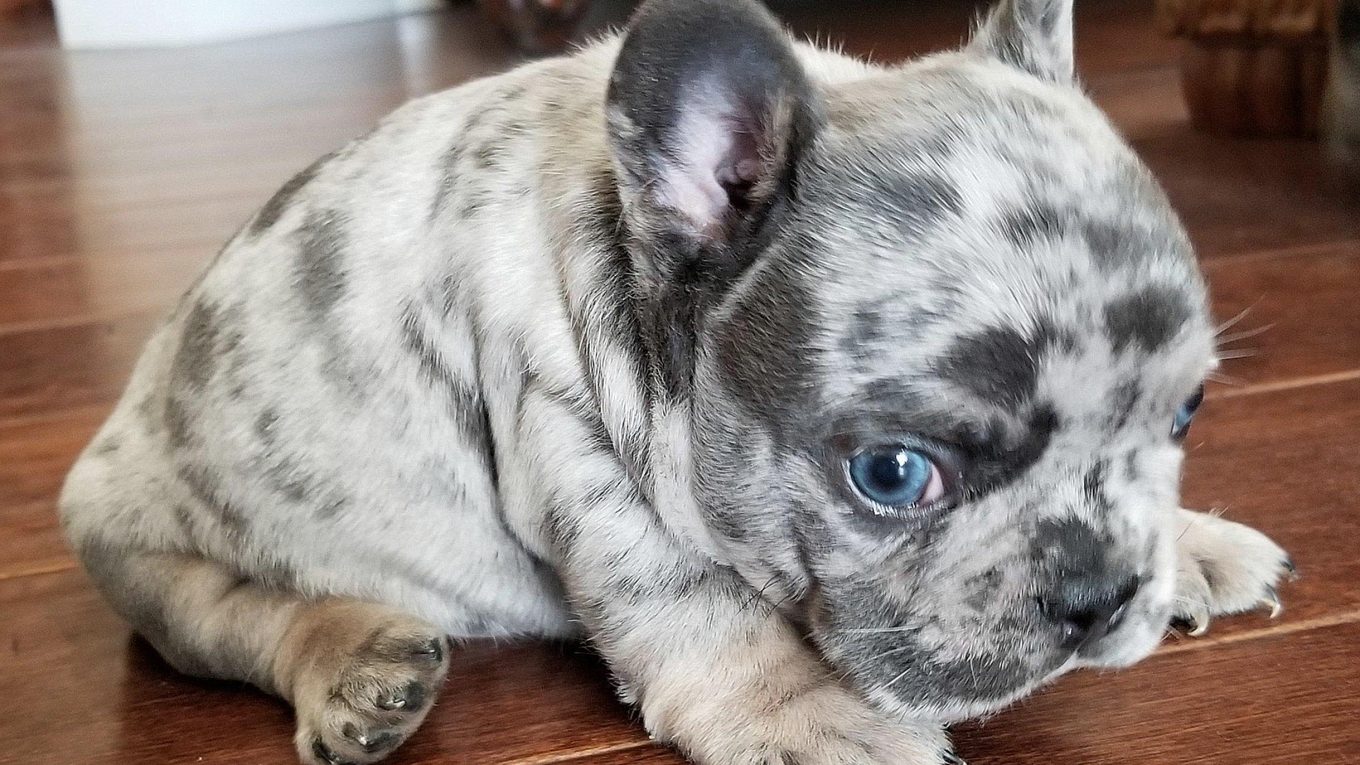Do French Bulldogs Come In Merle Color?
Today, we’re diving headfirst into the captivating world of French Bulldogs and uncovering a color variation that’s been causing quite a stir: the spellbinding merle coat.
Imagine this: a pint-sized French Bulldog with a coat that looks like it was painted by a master artist. The merle pattern is unlike anything you’ve ever seen before, with its mesmerizing blend of colors and captivating mottled effect. But here’s the burning question: are merle French Bulldogs natural or man-made?
Let’s take a journey back in time to unravel the history behind this enchanting coat variation. French Bulldogs first emerged in 19th century England as adorable companions, known for their charm and affectionate nature. However, the merle pattern wasn’t commonly found in the breed until more recent years.
Unlike some other breeds where merle is a naturally occurring color variation caused by specific genes, merle French Bulldogs have a slightly different story. These unique pups are the result of intentional breeding, where clever breeders introduced the merle gene through carefully planned crossbreeding with other dog breeds.
Of course, this introduction of the merle gene has sparked some heated debates within the breeding community. Traditionalists argue that it goes against the established breed standards set by kennel clubs since it isn’t a natural color for French Bulldogs. This controversy has led to differing opinions on whether breeding merle French Bulldogs is ethical or not.
But let’s put all that aside for now and focus on one undeniable fact: merle French Bulldogs are absolutely stunning. Their coats come in an array of breathtaking colors, ranging from delicate silver to striking blue (and everything in between). Each pup boasts their own unique pattern, making them easily recognizable and highly sought after by dog enthusiasts everywhere.
Now, it’s important to remember that responsible breeding is key when it comes to merle French Bulldogs. Ethical breeders prioritize the health and well-being of their dogs, ensuring that no health issues are associated with the merle gene. So, if you’re considering adding one of these enchanting pups to your family, do your homework, ask questions, and always buy from reputable sources who support responsible breeding practices.
So, join us on this exciting journey as we dive into the genetics behind their captivating coat patterns, discover their unique personality traits, and explore the proper care needed for these lovable
How Does the Merle Gene Affect French Bulldogs?
Contents
- 1 How Does the Merle Gene Affect French Bulldogs?
- 2 Is the Merle Color Recognized by Kennel Clubs?
- 3 Are There Any Health Risks Associated With Merle Coloring in French Bulldogs?
- 4 What is a Pseudo-Merle Color in French Bulldogs?
- 5 What Should Prospective French Bulldog Owners Know About Merle Coloring?
- 6 Why Do Responsible Breeders Avoid Breeding for Merle Coloring in French Bulldogs?
- 7 Are There Any Instances of True Merle Colors in French Bulldogs?
- 8 What Questions Should Prospective Owners Ask Breeders About Merle Colors?
- 8.1 Are your French Bulldogs merle carriers or capable of producing merle puppies?
- 8.2 What health and genetic testing have been done on your breeding dogs?
- 8.3 How knowledgeable are you about merle colors and their associated risks?
- 8.4 What are your breeding practices and ethics?
- 8.5 Can you provide references or testimonials from past puppy buyers?
- 8.6 Do you offer any guarantees or contracts?
- 8.7 Are you a member of recognized breed clubs or organizations?
- 9 Conclusion
French Bulldogs are beloved for their charming personalities and unique appearances. While the breed’s standard coat colors include fawn, brindle, and pied, some French Bulldogs exhibit a captivating merle coat pattern. In this article, we will explore the effects of the merle gene on French Bulldogs, shedding light on its genetic implications and potential health concerns.
Understanding the Merle Gene:
The merle gene is a genetic mutation that influences coat color patterns in dogs, including French Bulldogs. It produces a striking mottled or marbled appearance, with patches or streaks of lighter and darker shades. However, it’s important to note that merle is not a natural or standard color for French Bulldogs.
Health Risks Associated with Merle:
Breeding two merle French Bulldogs together can result in puppies with a higher chance of inheriting double merle genes. These double merle dogs are more prone to hearing and vision problems. Responsible breeders prioritize the well-being of their dogs and avoid intentionally breeding for the merle coat pattern to minimize these health risks.
Eye Abnormalities:
The merle gene can also affect pigmentation in the eyes, potentially leading to eye abnormalities or diseases in affected French Bulldogs. Regular check-ups with a veterinarian experienced in dealing with merle-colored dogs are crucial to monitor any potential eye issues.
Choosing a Merle French Bulldog:
If you are considering adopting or purchasing a merle French Bulldog, it is vital to educate yourself about the genetics behind the merle color and the associated health risks. Ensure that you choose a reputable breeder who prioritizes the breed’s standards and conducts proper health testing for their dogs.
Owning a Merle French Bulldog:
If you already have a merle French Bulldog, consult with a knowledgeable veterinarian to provide optimal care for your furry friend. Regular check-ups and health monitoring are essential to address any potential health issues promptly.
Is the Merle Color Recognized by Kennel Clubs?
Unfortunately, the merle color is not recognized by kennel clubs for French Bulldogs. Both the American Kennel Club (AKC) and the United Kennel Club (UKC), which are two of the most well-known kennel clubs, have strict breed standards that outline the acceptable colors and patterns for each breed. And guess what? Merle didn’t make the cut.
According to the AKC breed standard for French Bulldogs, only certain colors are recognized, including brindle, fawn, white, and pied (a fancy word for a combination of white and any of the recognized colors). Merle is nowhere to be found in this list. The UKC also follows a similar breed standard for French Bulldogs and doesn’t recognize merle as an acceptable color either.
But why does this matter? Well, it means that merle-colored French Bulldogs cannot participate in conformation shows or compete for titles like their counterparts with recognized colors can. So, if you were planning on showing off your unique merle-colored Frenchie in a competition, you might want to think again.
Not only that, but breeders who produce merle-colored French Bulldogs may face challenges in registering their dogs with kennel clubs. This can be a significant hurdle when it comes to selling them as purebred French Bulldogs. Potential buyers should be aware that merle-colored Frenchies may not meet the breed standards set by kennel clubs and may not have the same pedigree and lineage as recognized colors.
But wait, there’s more. Apart from the lack of recognition, there are also concerns about health implications associated with the merle gene in French Bulldogs. The merle gene can be linked to various health issues, including eye abnormalities and deafness. Responsible breeders prioritize the health and well-being of their dogs and typically avoid breeding merle-colored French Bulldogs to minimize these risks.

Are There Any Health Risks Associated With Merle Coloring in French Bulldogs?
If you’re a fan of the mesmerizing merle coloring in French Bulldogs, you might be wondering if there are any health risks associated with this unique coat color. Well, my friends, buckle up because I’m about to spill the beans on this topic.
Definition of merle coloring:
Let’s start with a quick definition. Merle coloring is a coat pattern that affects the distribution of pigmentation in the fur of French Bulldogs. It’s caused by a genetic mutation that gives the dogs a mottled or marbled appearance, with patches of diluted color against a darker background.
Health risks associated with merle coloring:
Now, onto the important stuff – potential health risks. French Bulldogs with merle coloring may be more prone to certain health issues due to the genetic mutation associated with this coat color. Here are some possible concerns to keep in mind:
- Vision and hearing problems: Unfortunately, merle coloring has been linked to an increased risk of eye abnormalities and deafness in dogs. French Bulldogs with merle coats may have a higher chance of being born with conditions like congenital deafness, iris coloboma (a defect in the iris), and microphthalmia (abnormally small eyes).
- Skin and coat issues: The same genetic mutation responsible for merle coloring can also affect the development of hair follicles and skin pigmentation. This can lead to various skin and coat problems, including alopecia (hair loss), sensitive skin, and an increased susceptibility to sunburn.
- Increased risk of certain diseases: Studies have suggested that French Bulldogs with merle coloring may have a higher likelihood of developing certain genetic disorders, such as hypothyroidism (an underactive thyroid gland), epilepsy, and autoimmune diseases.
Responsible breeding practices:
Now, before you start panicking, it’s important to note that responsible breeders prioritize the health and well-being of their French Bulldogs, regardless of their coat color. Good breeders are knowledgeable about the potential health risks associated with merle coloring and take necessary precautions to minimize these risks.
Genetic testing and health screening:
If you’re considering getting a merle-colored French Bulldog, it’s crucial to choose a reputable breeder who prioritizes genetic testing and health screening. Genetic tests can help identify any underlying health conditions or potential genetic abnormalities associated with merle coloring. This allows breeders to make informed breeding decisions and ensures that the dogs receive appropriate medical care.
What is a Pseudo-Merle Color in French Bulldogs?
While the breed standard recognizes specific coat colors and patterns, some breeders have introduced a new coat color pattern called Pseudo-Merle into the mix. In this blog post, we will explore what Pseudo-Merle color is, its origins, and the potential health risks associated with it.
What is Pseudo-Merle Color?
Pseudo-Merle color in French Bulldogs refers to a coat pattern that resembles the merle pattern found in other dog breeds like Australian Shepherds and Border Collies. Merle pattern creates marbled or mottled patches of diluted pigment on a solid background color. However, French Bulldogs do not naturally carry the merle gene.
Origins of Pseudo-Merle Color:
Pseudo-Merle color in French Bulldogs is believed to result from crossbreeding with other breeds that carry the merle gene. Some breeders have introduced merle-carrying breeds into their French Bulldog lines to produce this non-standard coat color. The allure of creating a unique and eye-catching coat pattern has led to the intentional breeding of Pseudo-Merle French Bulldogs.
Controversy Surrounding Pseudo-Merle Color:
While some people are drawn to the beauty of Pseudo-Merle French Bulldogs, this practice has sparked controversy among breed enthusiasts and experts. Responsible breeders prioritize the health and well-being of their dogs over producing trendy coat colors or patterns. It is important for potential buyers to be aware of the controversy surrounding Pseudo-Merle French Bulldogs and make an informed decision.
Health Risks Associated with Pseudo-Merle Color:
Although Pseudo-Merle French Bulldogs may not carry the merle gene itself, there is a concern that they may still inherit health risks if they were bred from dogs that do carry the gene. True merle dogs have an increased risk of eye abnormalities, hearing loss, and other health issues. Therefore, prospective owners should be cautious and seek out responsible breeders who prioritize the health of their dogs.
What Should Prospective French Bulldog Owners Know About Merle Coloring?
If you’re considering adding a French Bulldog to your family, you may have come across the intriguing and eye-catching merle coloring. But before you fall head over heels for this unique pattern, there are a few things you should know. Let’s dive into the world of merle French Bulldogs and uncover what prospective owners should be aware of.
The Marvelous Merle Coloring
Merle coloring in French Bulldogs is characterized by patches or spots of diluted color on a lighter base coat, creating a marbled or mottled appearance. It’s undeniably captivating and can make your Frenchie stand out from the pack.
Health Concerns to Consider
While merle coloring may be aesthetically pleasing, it’s important to understand the potential health risks associated with this coat pattern. Merle coloring is linked to a condition called Merle Ocular Dysgenesis (MOD), which can affect the development of the eyes and lead to various eye abnormalities and vision impairments. Additionally, merle-colored French Bulldogs may be more prone to deafness, skin problems, and neurological disorders.
Responsible Breeding is Key
When considering a merle-colored French Bulldog, it is crucial to choose a responsible and reputable breeder. A reputable breeder will prioritize the health and well-being of their dogs by performing necessary health screenings and genetic tests to ensure that their breeding stock does not carry any hereditary diseases or conditions. They will also provide proper care and socialization for their puppies to ensure they grow up to be healthy and well-adjusted.
Merle Coloring and Kennel Clubs
It’s important to note that merle coloring in French Bulldogs is not recognized by major kennel clubs such as the American Kennel Club (AKC) or the United Kennel Club (UKC). This means that merle-colored French Bulldogs cannot participate in conformation shows or be registered as purebreds with these organizations. However, this doesn’t diminish their potential as loving and loyal pets.
The Price of Uniqueness
If you’re eyeing a merle-colored French Bulldog, be prepared for a higher price tag compared to their standard-colored counterparts. Producing merle-colored puppies requires significant time, effort, and resources from breeders to ensure the health and well-being of their breeding stock and the puppies themselves. Additionally, the rarity and demand for merle French Bulldogs can drive up their price on the market.
Owning a French Bulldog, Merle or Not
Regardless of coat color, owning a French Bulldog requires a commitment to their unique needs. Regular exercise, a balanced diet, veterinary care, and socialization are all essential for their well-being. Prospective owners should carefully consider their lifestyle, resources, and ability to provide proper care before deciding to bring any French Bulldog into their home.
Why Do Responsible Breeders Avoid Breeding for Merle Coloring in French Bulldogs?
One such pattern that catches the eye is merle coloring. While it may be tempting to fall in love with these marbled beauties, responsible breeders have valid reasons for avoiding breeding for merle coloring in French Bulldogs. In this article, we will explore these reasons and shed light on the potential health issues associated with this coat pattern.
Health Issues:
- Deafness: The merle gene can interfere with the development of the inner ear, leading to partial or complete hearing loss. Responsible breeders prioritize the overall well-being of their dogs, and deafness can significantly impact a dog’s quality of life.
- Eye Abnormalities: Merle-colored French Bulldogs are more prone to eye abnormalities such as heterochromia (different colored eyes), microphthalmia (abnormally small eyes), or coloboma (a gap or hole in the structures of the eye). These conditions can cause vision impairment or even blindness, creating additional challenges for the affected dogs.
- Skin Issues: The patchy pigmentation caused by the merle gene can result in sensitive skin that is more susceptible to sunburns and other irritations. This can lead to discomfort, inflammation, and an increased risk of developing skin infections.
Preservation of Breed Standards:
Responsible breeders strive to maintain the unique characteristics of French Bulldogs, including a short coat and specific solid colors like fawn, brindle, or pied. Breeding for merle coloring can introduce traits that deviate from the breed standard, potentially diluting the distinctive qualities that define French Bulldogs.
Are There Any Instances of True Merle Colors in French Bulldogs?
French Bulldogs are cherished for their adorable appearance and friendly personalities. While they come in a range of stunning coat colors, one color pattern that is not naturally occurring in this breed is merle. In this blog post, we will explore the ethical implications and potential health risks associated with introducing the merle gene into French Bulldogs.
The Merle Gene: A Genetic Intruder
Merle is a coat pattern characterized by diluted color patches on a darker base coat. Although it is common in breeds like Australian Shepherds and Border Collies, it is not a desired trait in French Bulldogs. The merle gene is absent from the French Bulldog gene pool, making breeding for merle colors unethical.
The Dangers of Merle Breeding
Breeding French Bulldogs for merle colors can lead to severe health issues. The introduction of the merle gene has been known to increase the risk of deafness, blindness, and other neurological disorders. These health concerns compromise the overall well-being of the breed and should be a significant concern for potential owners.
Responsible Breeding Practices
Responsible breeders prioritize the health and welfare of French Bulldogs over aesthetic traits. They adhere to breed standards and avoid intentionally producing merle-colored puppies. Choosing a reputable breeder who focuses on preserving the breed’s integrity ensures that you bring home a healthy and happy companion.
What Questions Should Prospective Owners Ask Breeders About Merle Colors?
When considering purchasing a French Bulldog with a merle coat, it’s crucial to ask the right questions to ensure you’re dealing with a responsible breeder. The merle pattern is not a natural color in French Bulldogs, and breeding for this specific trait can come with potential health risks. In this blog post, we’ll explore the key questions prospective owners should ask breeders to make an informed decision and prioritize the well-being of their future furry friend.
Are your French Bulldogs merle carriers or capable of producing merle puppies?
Knowing if the breeder’s dogs carry the merle gene is essential. This genetic trait can be passed down to offspring, so it’s important to understand if the puppies have the potential to exhibit the merle coat color.
What health and genetic testing have been done on your breeding dogs?
Merle colors, especially when combined with certain genes, can be associated with health issues like deafness, eye problems, and skin abnormalities. Responsible breeders prioritize the health of their dogs and conduct appropriate health tests to ensure they are breeding healthy puppies.
How knowledgeable are you about merle colors and their associated risks?
A reputable breeder should have a deep understanding of the genetics behind merle and be able to provide accurate information about the potential health concerns associated with breeding merle French Bulldogs. Their knowledge will help you make an informed decision about whether a merle French Bulldog is right for you.
What are your breeding practices and ethics?
Breeders who prioritize health and well-being will not breed solely for unique coat colors without considering potential health risks. It’s important to ensure that the breeder follows responsible breeding practices, prioritizing the welfare of their dogs and producing healthy, well-adjusted puppies.
Can you provide references or testimonials from past puppy buyers?
Speaking to previous buyers who have acquired merle French Bulldogs from the breeder can provide valuable insights into their reputation and the quality of their breeding program. Positive testimonials indicate a breeder’s commitment to producing healthy puppies with good temperaments.
Do you offer any guarantees or contracts?
Reputable breeders often provide health guarantees and contracts outlining their responsibilities and the buyer’s rights in case any health issues arise with the puppy. Asking about these guarantees will ensure you have peace of mind and protection for your new furry companion.
Are you a member of recognized breed clubs or organizations?
Being affiliated with reputable breed clubs or organizations indicates that the breeder follows ethical breeding practices and adheres to breed standards. This affiliation further ensures that the breeder is committed to producing healthy and well-tempered merle French Bulldogs.
Conclusion
In conclusion, French Bulldogs do not come in merle color.
This unique and captivating coat pattern is not recognized or accepted by breed standards. It is important for potential French Bulldog owners to be aware of this fact, as there are some unethical breeders who may falsely advertise merle-colored French Bulldogs.
By understanding the true nature of the breed’s coat colors, individuals can make informed decisions and ensure the well-being of these delightful companions.




